
Organic farming, also known as ecological farming or biological farming, is an agricultural system that uses fertilizers of organic origin such as compost manure, green manure, and bone meal and places emphasis on techniques such as crop rotation and companion planting. It originated early in the 20th century in reaction to rapidly changing farming practices. Certified organic agriculture accounts for 70 million hectares globally, with over half of that total in Australia. Biological pest control, mixed cropping, and the fostering of insect predators are encouraged. Organic standards are designed to allow the use of naturally-occurring substances while prohibiting or strictly limiting synthetic substances. For instance, naturally-occurring pesticides such as pyrethrin are permitted, while synthetic fertilizers and pesticides are generally prohibited. Synthetic substances that are allowed include, for example, copper sulfate, elemental sulfur, and veterinary drugs. Genetically modified organisms, nanomaterials, human sewage sludge, plant growth regulators, hormones, and antibiotic use in livestock husbandry are prohibited. Organic farming advocates claim advantages in sustainability, openness, self-sufficiency, autonomy and independence, health, food security, and food safety.
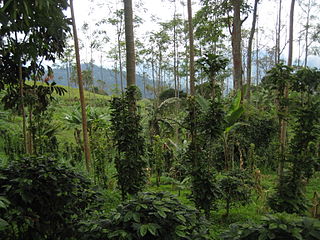
Sustainable agriculture is farming in sustainable ways meeting society's present food and textile needs, without compromising the ability for current or future generations to meet their needs. It can be based on an understanding of ecosystem services. There are many methods to increase the sustainability of agriculture. When developing agriculture within sustainable food systems, it is important to develop flexible business process and farming practices. Agriculture has an enormous environmental footprint, playing a significant role in causing climate change, water scarcity, water pollution, land degradation, deforestation and other processes; it is simultaneously causing environmental changes and being impacted by these changes. Sustainable agriculture consists of environment friendly methods of farming that allow the production of crops or livestock without damage to human or natural systems. It involves preventing adverse effects to soil, water, biodiversity, surrounding or downstream resources—as well as to those working or living on the farm or in neighboring areas. Elements of sustainable agriculture can include permaculture, agroforestry, mixed farming, multiple cropping, and crop rotation.
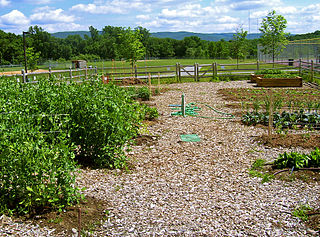
The following outline is provided as an overview of and topical guide to organic gardening and farming:

Community-supported agriculture or cropsharing is a system that connects producers and consumers within the food system closer by allowing the consumer to subscribe to the harvest of a certain farm or group of farms. It is an alternative socioeconomic model of agriculture and food distribution that allows the producer and consumer to share the risks of farming. The model is a subcategory of civic agriculture that has an overarching goal of strengthening a sense of community through local markets.
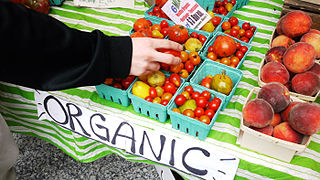
The organic movement broadly refers to the organizations and individuals involved worldwide in the promotion of organic food and other organic products. It started during the first half of the 20th century, when modern large-scale agricultural practices began to appear.

Organic certification is a certification process for producers of organic food and other organic agricultural products, in the European Union more commonly known as ecological or biological products. In general, any business directly involved in food production can be certified, including seed suppliers, farmers, food processors, retailers and restaurants. A lesser known counterpart is certification for organic textiles that includes certification of textile products made from organically grown fibres.

The Soil Association is a British registered charity, working to transform the way Britain eats, farms and cares for the natural world. It was established in 1946. Their activities include campaigning for local purchasing, public education on nutrition and certification of organic foods, and against intensive farming.
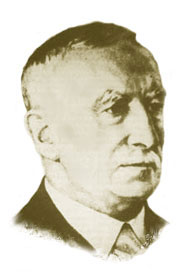
Sir Albert Howard was an English botanist. His academic background might have been botany. While working in India he was generally considered a pathologist; this more than likely being the reason for his consistent observations of the value of compost applications being an increase in health. Howard was the first Westerner to document and publish the Indian techniques of sustainable agriculture. After spending considerable time learning from Indian peasants and the pests present in their soil, he called these two his professors. He was a principal figure in the early organic movement. He is considered by many in the English-speaking world to have been, along Eve Balfour, one of the key advocates of ancient Indian techniques of organic agriculture.
Biodynamic agriculture is a form of alternative agriculture based on pseudo-scientific and esoteric concepts initially developed in 1924 by Rudolf Steiner (1861–1925). It was the first of the organic farming movements. It treats soil fertility, plant growth, and livestock care as ecologically interrelated tasks, emphasizing spiritual and mystical perspectives.

Traditional farming was the original type of agriculture, and has been practiced for thousands of years. All traditional farming is now considered to be "organic farming" although at the time there were no known inorganic methods. For example, forest gardening, a fully organic food production system which dates from prehistoric times, is thought to be the world's oldest and most resilient agroecosystem. The industrial revolution introduced inorganic methods, most of which were not well developed and had serious side effects. An organic movement began in the 1940s as a reaction to agriculture's growing reliance on synthetic fertilizers and pesticides. The history of this modern revival of organic farming dates back to the first half of the 20th century at a time when there was a growing reliance on these new synthetic, non-organic methods.
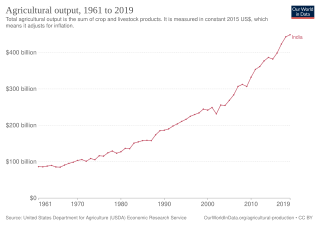
The history of agriculture in India dates back to the Neolithic period. India ranks second worldwide in farm outputs. As per the Indian economic survey 2020 -21, agriculture employed more than 50% of the Indian workforce and contributed 20.2% to the country's GDP.

Organic food, ecological food, or biological food are foods and drinks produced by methods complying with the standards of organic farming. Standards vary worldwide, but organic farming features practices that cycle resources, promote ecological balance, and conserve biodiversity. Organizations regulating organic products may restrict the use of certain pesticides and fertilizers in the farming methods used to produce such products. Organic foods are typically not processed using irradiation, industrial solvents, or synthetic food additives.
Robert David Rodale (Cohen) (March 27, 1930 – September 20, 1990) was an American publisher who was president and chief executive officer of Rodale, Inc., a company founded in 1930 by his father J. I. Rodale in Emmaus, Pennsylvania.
Animal-free agriculture, also known as veganic agriculture, stockfree farming or veganic farming, consists of farming methods that do not use animals or animal products.
The Northeast Organic Farming Association (NOFA) is a 501(c) non-profit organization in the United States that promotes healthy food, organic farming practices, and a clean environment. It was founded in Connecticut in 1982. The purpose of the organization is to provide educational conferences, workshops, farm tours, and printed materials to educate farmers, gardeners, consumers, and land care professionals.

Natural farming, also referred to as "the Fukuoka Method", "the natural way of farming", or "do-nothing farming", is an ecological farming approach established by Masanobu Fukuoka (1913–2008). Fukuoka, a Japanese farmer and philosopher, introduced the term in his 1975 book The One-Straw Revolution. The title refers not to lack of effort, but to the avoidance of manufactured inputs and equipment. Natural farming is related to fertility farming, organic farming, sustainable agriculture, agroecology, agroforestry, ecoagriculture and permaculture, but should be distinguished from biodynamic agriculture.
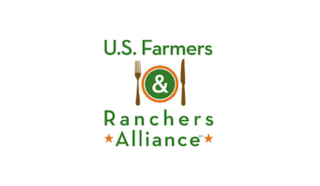
The U.S. Farmers and Ranchers Alliance is an alliance of agriculture related interest groups and organizations that promote industrial agriculture in the United States. Their aim is to promote a positive image of modern agricultural practices. They are supported by checkoff funds from the United States Department of Agriculture and by cooperate donations. The alliance has been criticized for a bias towards corporate agricultural practices.

Regenerative agriculture is a conservation and rehabilitation approach to food and farming systems. It focuses on topsoil regeneration, increasing biodiversity, improving the water cycle, enhancing ecosystem services, supporting biosequestration, increasing resilience to climate change, and strengthening the health and vitality of farm soil.

Frank Newman Turner, NDA, NDD, FNIMH, was a British pioneering organic farmer, writer and broadcaster, who, based on his experience of natural treatment of animals, later became a consulting medical herbalist and naturopath. His books Fertility Farming, Fertility Pastures, and Herdsmanship are regarded as classics of practical organic husbandry.
Will Bonsall is an American author, seed saver and veganic farmer who lives in Maine. He is a regular speaker about seed saving, organic farming and veganic farming.













